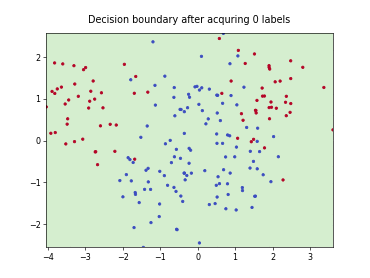skactiveml.pool.DiscriminativeAL#
- class skactiveml.pool.DiscriminativeAL(greedy_selection=False, missing_label=nan, random_state=None)[source]#
Bases:
SingleAnnotatorPoolQueryStrategyDiscriminative Active Learning.
This class implement the “Discriminative Active Learning” (DAL) strategy. Its idea is to solve a binary classification task to choose samples for labeling such that the labeled set and the unlabeled pool are indistinguishable.
- Parameters
- greedy_selectionbool, optional (default=False)
This parameter is only relevant for batch_size>1. If greedy_selection=False the classifying discriminator is refitted after each sample selection within a batch. Otherwise, the discriminator is kept fixed.
- missing_labelscalar or string or np.nan or None, optional
- (default=np.nan)
Value to represent a missing label.
- random_stateNone or int or np.random.RandomState, optional
- (default=None)
The random state to use.
References
- [1] Gissin D, Shalev-Shwartz S. “Discriminative active learning.”
arXiv:1907.06347. 2019.
Methods
Get metadata routing of this object.
get_params([deep])Get parameters for this estimator.
query(X, y, discriminator[, candidates, ...])Determines for which candidate samples labels are to be queried.
set_params(**params)Set the parameters of this estimator.
- get_metadata_routing()#
Get metadata routing of this object.
Please check User Guide on how the routing mechanism works.
- Returns
- routingMetadataRequest
A
MetadataRequestencapsulating routing information.
- get_params(deep=True)#
Get parameters for this estimator.
- Parameters
- deepbool, default=True
If True, will return the parameters for this estimator and contained subobjects that are estimators.
- Returns
- paramsdict
Parameter names mapped to their values.
- query(X, y, discriminator, candidates=None, batch_size=1, return_utilities=False)[source]#
Determines for which candidate samples labels are to be queried.
- Parameters
- Xarray-like of shape (n_samples, n_features)
Training data set, usually complete, i.e., including the labeled and unlabeled samples.
- yarray-like of shape (n_samples)
Labels of the training data set (possibly including unlabeled ones indicated by self.missing_label).
- discriminatorskactiveml.base.SkactivemlClassifier
Model implementing the methods fit and predict_proba. The parameters classes and missing_label will be internally redefined.
- candidatesNone or array-like of shape (n_candidates), dtype=int or
- array-like of shape (n_candidates, n_features), optional (default=None)
If candidates is None, the unlabeled samples from (X, y) are considered as candidates. If candidates is of shape (n_candidates,) and of type int, candidates is considered as the indices of the samples in (X, y). If candidates is of shape (n_candidates, n_features), the candidates are directly given in candidates (not necessarily contained in X).
- batch_sizeint, optional (default=1)
The number of samples to be selected in one AL cycle.
- return_utilitiesbool, optional (default=False)
If true, also return the utilities based on the query strategy.
- Returns
- query_indicesnumpy.ndarray of shape (batch_size,)
The query_indices indicate for which candidate sample a label is to be queried, e.g., query_indices[0] indicates the index of the first selected sample. If candidates is None or of shape (n_candidates,), the indexing refers to samples in X. If candidates is of shape (n_candidates, n_features), the indexing refers to samples in candidates.
- utilitiesnumpy.ndarray of shape (batch_size, n_samples) or
- numpy.ndarray of shape (batch_size, n_candidates)
The utilities of samples after each selected sample of the batch, e.g., utilities[0] indicates the utilities used for selecting the first sample (with index query_indices[0]) of the batch. Utilities for labeled samples will be set to np.nan. If candidates is None or of shape (n_candidates,), the indexing refers to samples in X. If candidates is of shape (n_candidates, n_features), the indexing refers to samples in candidates.
- set_params(**params)#
Set the parameters of this estimator.
The method works on simple estimators as well as on nested objects (such as
Pipeline). The latter have parameters of the form<component>__<parameter>so that it’s possible to update each component of a nested object.- Parameters
- **paramsdict
Estimator parameters.
- Returns
- selfestimator instance
Estimator instance.
